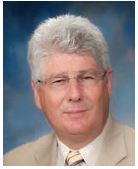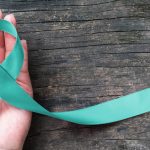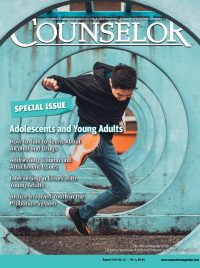Share
Being a father is one of most important roles a man can have in his life. It comes with great responsibility and the opportunity to mentor and influence the next generation. Being a father has been one of the greatest joys of my life.
Since Father’s Day, I have been thinking about fathers impaired by an addiction and the effect this has on their adult sons. This came after a discussion with my brother about our experiences growing up with a dad who had a severe alcohol addiction and mental health problems. Although we acknowledged growing up in a chaotic and unpredictable family with many struggles and problems, we believe we succeeded as parents from what we learned about our father’s inability to function effectively as a result of his addiction and mental health problems.
This discussion with my brother and several other experiences led me to wanting to share my thoughts about addicted fathers and their sons. First, I was touched by the many friends and family members who posted photos of their dads—some still living, but many having passed away—on Facebook with beautiful and heartfelt comments about their relationships with their fathers. A few of these fathers I knew personally, which made these posts more meaningful. While I appreciated seeing photos and hearing about these father-son or father-daughter relationships, it made me realize that some of us do not have many fond memories of our relationship with our fathers. Sadly, some adults still struggle with awful memories and strong negative emotions related to their experiences with addicted fathers. These feelings range from anger to disdain, and in some cases hatred, which is very sad indeed. Although intense negative emotions are not to be blamed on addicted fathers, they do have a role in affecting how their adult children feel.
Second, I have friends and colleagues and I worked with many adults in treatment who had (or still have) fathers with an addiction. Some fathers never get help and die prematurely from accidents, drug overdoses, or medical problems caused or exacerbated by their substance use. Others are incarcerated, and some have minimal or no contact with their adult children.
Third, I worked with and know adults whose fathers got help for their addiction and engaged in recovery, engaged in a mutual-aid program (with or without treatment), or quit using substances on their own. Some fathers reconciled with their adult children, and “made amends” as suggested in Twelve Step programs. Many became active in the lives of their adult sons.
Fourth, I know some adults who cut all ties with their fathers and want nothing to do with them. The emotional pain is often deep and these individuals struggle with forgiveness.
Fathers affect their adult children in many ways during their active addiction, recovery, or both. The specific effects depend on the type and severity of these fathers’ addictions, their behaviors, their health and functioning as parents, whether they engaged in recovery, and their unique relationships with their adult children. Adult children’s resilience, ability to forgive, and coping skills also play a role in the impact of their fathers’ addiction.
A Personal Perspective
My brother and I discussed our experiences and memories growing up. We both agreed we learned how to be good fathers from watching our dad’s mistakes. Both of us forgave him years ago, and my brother thought dad was “troubled by his experiences in WW2.” Dad was stationed in Hawaii when it was bombed and later fought as a twenty-one-year-old machine gunner in New Guinea where he was wounded, later receiving a Purple Heart from the military. We believe he suffered from posttraumatic stress disorder (which was not identified years ago or even addressed as it is now), chronic depression, anxiety, and severe alcoholism. We believe he did the best he could given these serious problems. We also believe that medical professionals did an inadequate job helping him with his alcohol and mental health problems until he was in his late sixties. My mother told me that dad’s primary care doctor once told him to “cut down” on his drinking. While this was well-intended advice, it seldom helps people with a severe alcohol problem.
Dad was a psychologically absent father and was not involved much in our daily lives. He was often unemployed, so our family had to rely on public housing and welfare to survive. Our mother essentially raised six children on her own. She cleaned tables in McDonald’s and offices to make a few bucks to support us. Dad never attended a school or athletic event, the birth of his grandchildren, or some of our weddings. He and I never discussed my experiences in school, future goals, sports, friends, sex, money (other than his demand to give him money we earned as young boys), politics, or anything of significance. Our family never took a vacation or went out to dinner or a movie together. The only event outside of our home shared as a family was an occasional picnic at a local park where we barbecued, played baseball, and swam. It was great fun until dad got drunk and his nasty side came out. He would drive us six kids and mom home while drunk, and berate mom on the way.
When drinking, dad sometimes was nasty and violent. When not drinking, he often was depressed and low-key. Without getting into too many examples, suffice it to say that our father exposed us to some of the worst experiences a child could having growing up.
Despite academic underachievement and low-level thievery during our youth, my brother and I both got help and support from others, enabling us to survive a chaotic home environment and later thrive in life due to our resiliency and the love and support of spouses and other relatives. We also benefitted from teachers, coaches, and experience in the US military.
The other good news is that our father got sober at age sixty-six, during the period in which our mom was dying from cancer. A colleague of mine, an addiction psychiatrist, treated him for his alcoholism and mental health problems. Dad died sober at age eighty. Although there were minor improvements in my relationship with my dad after he got sober, I never felt close to him or that he had much of an interest in my life or my family.
I do not think my personal family experience is unique. I have heard stories of the same family chaos from many people. Some experienced greater poverty, violence, or indifference from their addicted fathers. I vividly remember one man in a treatment group making a statement that he would like to urinate on his father’s grave. You can imagine the internal pain of this man.
One of the most profound experiences I had was attending the “Vigil of Hope” events of a local mutual-aid program for families, which was held annually for those who lost loved ones to addiction. Photos of lost loved ones were placed on a table on the stage, there were brief presentations, and a ritual in which participants could light a candle and make a statement about their loss. I attended three Vigils, all of which were moving experiences. A memorable comment was made by a nine- or ten-year-old boy who said, “I light this candle for my dad, who died when I was three.” You can imagine the tears that were shed by many of us hearing this innocent boy’s statement of losing his father so early in life. Tragic indeed!
The Adult Children of Addiction (ACoA) Movement
The ACoA movement that started decades ago made a significant contribution to the recovery and growth of many adult children affected by the addiction of a father, mother, caretaker, or other significant person. It led to numerous conferences and educational programs, inclusion of ACoA groups in treatment programs and clinics, development of mutual-aid programs for ACoAs, research, and publications in articles, books, and recovery guides.
This movement validated the experiences of many adults, which led to more of us getting personal therapy and/or engaging in mutual-aid programs. It allowed those of us who did not have a “disorder” to get help. I believe it also influenced those of us who had our own substance problems to get help.
How to Help Fathers and Adult Children
Understanding the experiences of fathers with addiction and the impact this can have on their children can help practitioners and others provide help and support. Here are a few ideas to consider.
For Adults Affected by Their Fathers’ Addiction
You can raise awareness of the impact of addiction on families and individual members, including adult children. Some may not realize the impact this had on their lives and current moods, behaviors, or relationships.
It is essential to provide education and support to those you believe need to heal from the effects of a father’s addiction. Some will not want help or support, or do not think they need it. There are many recovery writings you can suggest that provide information and insight on the ACoA experience as well as what others have done to recover from the adverse effects of parental addiction on their lives, and grow psychologically, spiritually, and socially.
Psychiatric and addiction treatment programs can include questions in their evaluations about experiences with addicted fathers, and offer services if people are interested. For example, I provided an ACoA group in an addiction rehabilitation program, a psychiatric inpatient unit, and a University health center.
You can facilitate involvement in therapy, counseling, and/or mutual-aid programs for those struggling with intense negative emotions or their own mental health or substance problems. People with depressive or anxiety disorders that cause suffering that affects their functioning can benefit from the help and support of others. Al-Anon, Nar-Anon, CoDA, and other mutual-aid programs are excellent resources for adults. Any of these resources can help individuals reduce negative feelings, start the process of forgiveness, and determine if an active relationship with their fathers is possible.
For Addicted Fathers
For fathers who are not in a treatment or recovery program, discuss options and facilitate entry if they are interested and willing. If they are hesitant, suggest trying a few sessions before determining if these options can help. Being in recovery puts these fathers in a better position to examine the effects of their addiction on their families and children as well as learn what is reasonable for them to do or not do to address this.
Ask fathers for their thoughts about how their addiction may have affected their young or adult children. Convey that it is common for parental addiction to hurt children in the family, and explain there is considerable evidence that parental addiction has an adverse effect on children’s mental and physical health, substance use, behavior, and academic problems. If information shared by these fathers indicates their children have any of these problems, help the fathers explore potential resources that can help their children.
For fathers who are not involved in the lives of their children, discuss the reasons for this. Help them examine if it is realistic to attempt to reconcile at this time, to wait, or to put off making this decision. Sadly, some adult children want nothing to do with their fathers, even if the fathers are in recovery, and some even have stopped all communication. To me, this is one of the worst effects of parental addiction.
Fathers in recovery can “make amends” if the time and circumstances are right. This can be discussed with a therapist, counselor, Twelve Step sponsor, or peer in recovery who has made amends and understands the challenges of this process. The key is making an attempt to hear and understand the experiences of their adult children rather than just asking for forgiveness.
Conclusion
Helping fathers with addiction explore this experience and potential ways to reconcile with their adult sons or daughters has many benefits. So does helping the adult children, many of whom can benefit from help and support to heal and move beyond their hurt and pain.
Suggested Readings
Ackerman, R. J. (1994). Silent sons: A book for and about men. New York, NY: Touchstone.
Ackerman, R. J. (2002). Perfect daughters: Adult daughters of alcoholics. Deerfield Beach, FL: Health Communications.
Daley, D. C., & Douaihy, A. (2019). A family guide to coping with substance use disorders. New York, NY: Oxford University Press.
Gross, K. A., Lagos, M. E., Yessengaliyeva, E., LaCasse, M. M., & Leipman, M. R. (2019). Family involvement in addiction, treatment, and recovery. In S. C. Miller, D. A. Fiellin, R. N. Rosenthal, & R. Saitz (Eds.), The ASAM principles of addiction Medicine (6th ed.) (pp. 1010–26). New York, NY: Wolters Kluwer.
McMahon, T. J. (2013). Substance-abusing fathers: A developmental perspective. In N. E. Suchman, M. Pajulo, & L. C. Mayes (Eds.), Parenting and substance abuse: Developmental approaches to intervention (pp. 156–82). New York, NY: Oxford University Press.
Woititz, J. G. (1990). Adult children of alcoholics. Deerfield Beach, FL: Health Communications.

Dennis Daley, PhD
Dennis C. Daley, PhD, served many roles at the University of Pittsburgh School of Medicine. He is the author of many articles, treatment manuals, books, and guides for families and children affected by addiction. He helped facilitate B2H programs at two hospitals.












 Counselor Magazine is the official publication of the California Association of Addiction Programs and Professionals (CCAPP). Counselor offers online continuing education, article archives, subscription deals, and article submission guidelines. It has been serving the addiction field for more than thirty years.
Counselor Magazine is the official publication of the California Association of Addiction Programs and Professionals (CCAPP). Counselor offers online continuing education, article archives, subscription deals, and article submission guidelines. It has been serving the addiction field for more than thirty years.